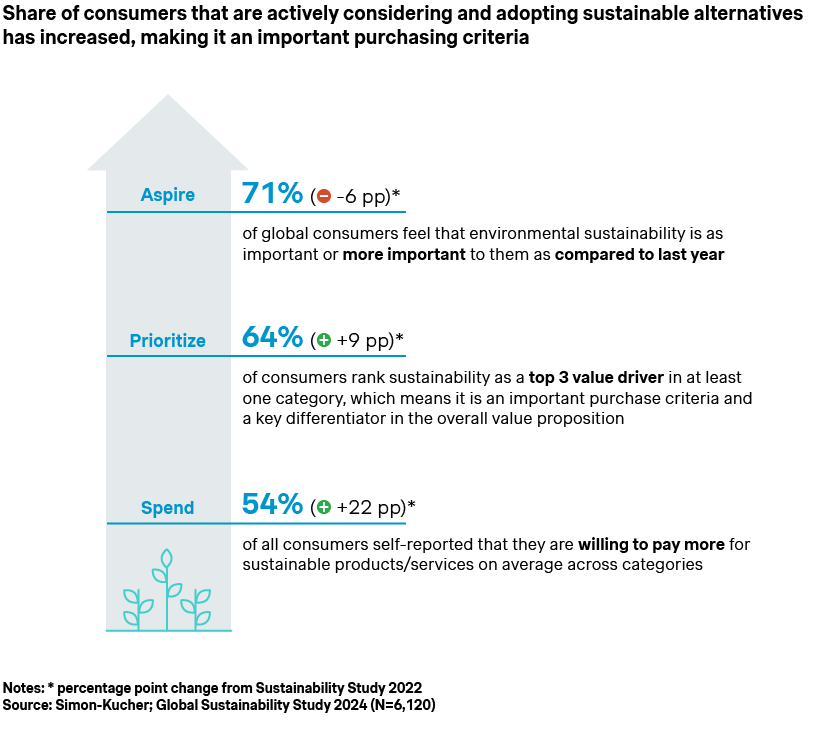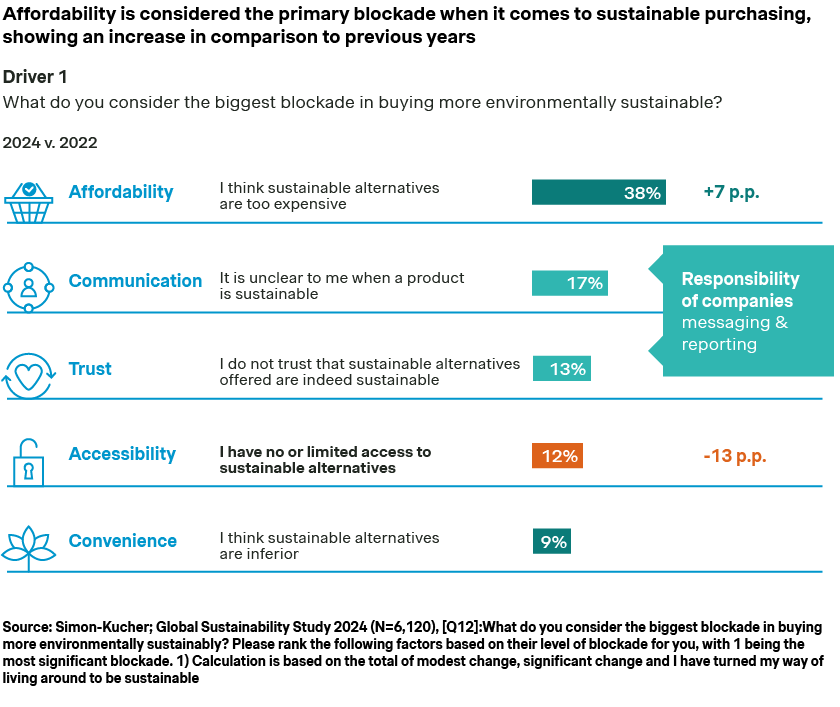Businesses' growth strategies are becoming increasingly dependent on global consumers' attitudes and willingness to pay for sustainable products and services. We surveyed over 6,000 consumers globally to understand consumer sentiment regarding sustainability and to assist businesses in meeting market demand.
Consumers are the engine of global economic growth, and their evolving attitudes towards environmental sustainability send a clear message to businesses: previously viewed as a peripheral issue, sustainability is now a critical factor for business success.
At Simon-Kucher, we recently conducted our Global Sustainability Study 2024, surveying 6120 consumers across six countries (USA, Germany, UK, Australia, The Netherlands, and India). This comprehensive analysis reveals a fascinating picture – a growing prioritization of sustainability alongside a persistent affordability challenge.
A shift in perception: Importance wanes, but commitment grows
Our study presents a seemingly contradictory trend. While 71 percent of global consumers consider environmental sustainability as important or more important than last year, this figure reflects a 6-percentage point decline compared to 2022.
The dip is likely driven by inflationary pressures, which impact purchasing power and force consumers to prioritize immediate needs. However, a closer look reveals a more nuanced reality.

Sustainability is becoming a standard consideration. While perceived importance has dipped slightly, there's a significant rise (64 percent) in consumers ranking sustainability as a top-three value driver across product categories. This indicates that sustainability is transitioning from a "nice-to-have" to a standard evaluation/purchase criterion.
For this increasing number of consumers, actively incorporating sustainability into their purchase decisions is a central consideration. They seek sustainable alternatives and expect businesses to deliver on this crucial aspect.
Affordability remains a hurdle, but accessibility improves.
Affordability or high price perception is still the biggest obstacle for 38 percent of surveyed consumers (+7pp from 2022) with sustainable purchasing. Unfortunately, many perceive sustainable alternatives as more expensive than their traditional counterparts. This highlights the crucial need for businesses to bridge the affordability gap by matching their prices with the consumer’s willingness-to-pay.
However, there's a positive development. Accessibility of sustainable alternatives has improved significantly. Compared to 2022, there's a 13-percentage point decrease in the reported barriers to accessing sustainable products. This indicates a growing availability of sustainable options, essential for encouraging consumer behavior change.

Consumers take charge: Demystifying sustainability claims
Our study reveals a growing trend of consumer scepticism. Nearly 70 percent of respondents conduct at least some research before trusting a brand's sustainability claims. This signals the rise of the informed, eco-conscious consumer actively investigating a company's sustainability practices before making a purchase.
Greenwashing is a major concern. 57 percent of consumers believe brands they use are guilty of "greenwashing" – making exaggerated or misleading claims about sustainability. Businesses must be transparent and exhibit a genuine commitment to environmental responsibility to build trust with the discerning customers.
The willingness-to-pay puzzle: Price premium for a sustainable future
Despite the affordability challenge, there's a positive shift in willingness-to-pay. 54 percent of consumers are now willing to pay a premium for sustainable products and services, representing a significant increase from 2022.
The trend is particularly strong in the automotive and consumer goods. However, the premium remains a hurdle for some. This highlights the need for businesses to optimize pricing strategies to align with consumer willingness to pay.
Businesses must bridge the gap between intention and action
The Simon-Kucher Global Sustainability Study 2024 paints a clear picture: consumers increasingly prioritize sustainability, even with affordability concerns. To thrive in this new reality, businesses must take decisive action.
1. Target the right segments and tailor your offerings: Don't implement a one-size-fits-all approach. Conduct market research to identify consumer segments that prioritize sustainability and understand their specific needs. Develop product lines that cater to their preferences and willingness-to-pay for sustainable features.
2. Meet sustainability expectations and build trust: Today's consumers are well-informed – ensure your products and practices meet relevant sustainability criteria. Focus on certifications, ethical sourcing, and environmental impact reduction. Transparency is key – communicate your sustainability efforts openly to build long-lasting trust.
3. Optimize pricing and bridge the affordability gap: Price your sustainable offerings competitively while considering consumer willingness-to-pay. Explore alternative pricing models and highlight the long-term value proposition (e.g., lower maintenance costs) to improve price perception.
4. Communicate value and foster loyalty: Don't just sell products, share the sustainability story. Clearly communicate the environmental and ethical benefits of your offerings. Showcase the added value proposition and how it aligns with their desire to make a positive impact. This fosters customer loyalty and retention.
Sustainability is not a fad. What will you do next?
A sustainable future is a shared responsibility. The Simon-Kucher Global Sustainability Study 2024 underscores a crucial message: consumers are ready to embrace sustainability, but businesses must meet them halfway.
Consumers are demanding genuine commitment and a demonstrable impact on environmental issues. This requires a comprehensive and transparent sustainability approach that goes beyond superficial gestures. As we move forward, collaboration and innovation will be vital to achieving a future where environmental responsibility and economic growth go hand-in-hand.
Download our Global Sustainability Study 2024 for a deeper dive into what matters most to your consumers.
To discuss how your business can implement a winning sustainability strategy that aligns with your growth objectives, get in touch with us today.
Thanks to contributions by Tim Verbeek!
